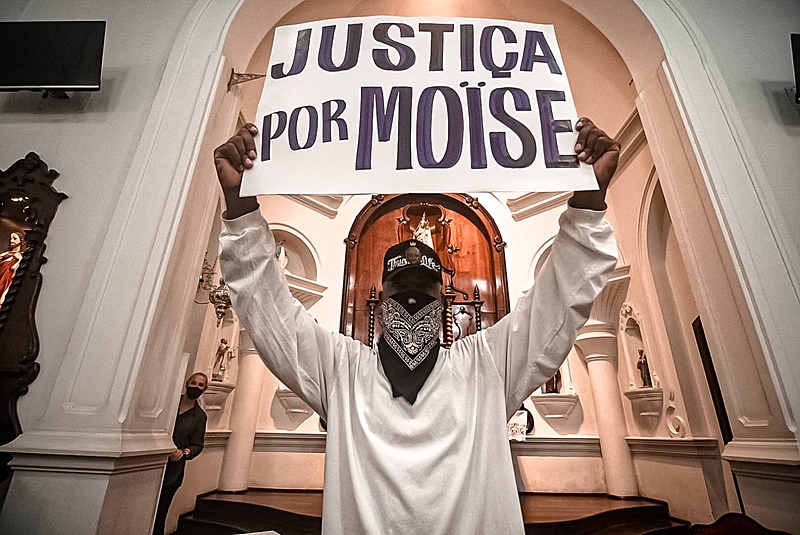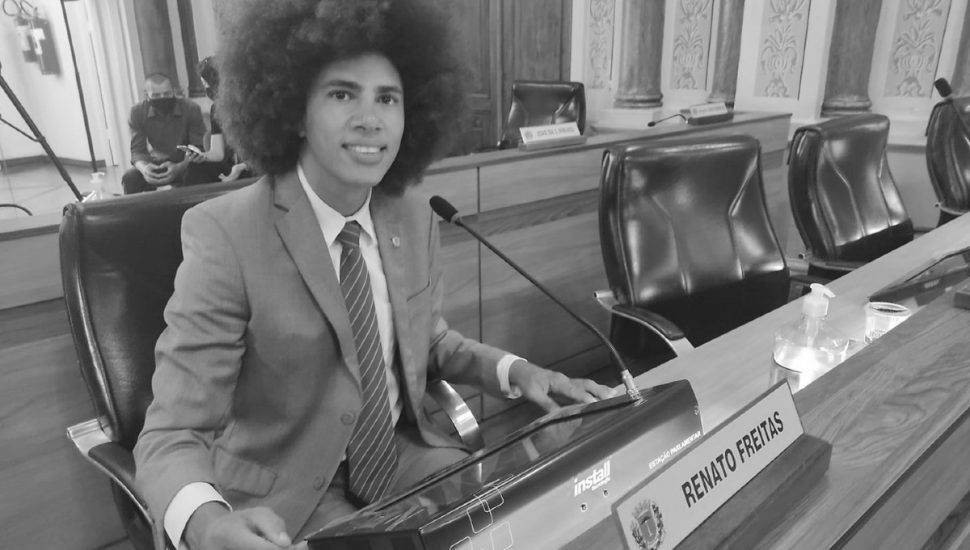The first impeachment process against a city councilor in the 329-year history of Curitiba – the Brazilian city that most cherishes its “European heritage” – is underway, and it has nothing to do with any crime.
On January 24, Mugenyi Kabagambe, a 24 year-old Congolese immigrant, was beaten to death behind the beach kiosk where he worked in Rio de Janeiro shortly after demanding he be paid his back wages. Brazil’s black movements immediately swung into action and organized a day of national protest for February 5.
That day in the conservative city of Curitiba, protesters marched through downtown, up to the steps of Rosario Church. After deliberation, a group of them entered the church itself as part of the protest. Rosario Church , originally built in 1737, is symbolically important for the city’s 20% Afro-Brazilian population, as it was originally built by and for slaves. the church was nearly empty at the time. Inside, a church official handed Freitas a microphone and he made a short speech, after which the protesters peacefully left the area.

“Justice for Moise,” reads a sign held by protester in Rosario church. Photo: Giorgia Prates – Brasil do Fato
Shortly afterwards, out of context videos began circulating on the internet blaming Freitas, of leading an angry mob into a church while mass was underway and threatening churchgoers.
Curitiba’s nearly all white city-council, made up primarily of supporters of far right President Jair Bolsonaro, immediately filed for impeachment of Freitas for breach of parliamentary decorum, falsely accusing him of organizing the protest, brandishing a flag with the Workers Party logo on it, and leading the march into a church while mass was underway.
Video, photographic and eyewitness accounts prove that: 1) the mass had already ended when the protesters arrived; 2) Freitas wasn’t in the first group that entered the church; 3) the only political party flag that was brandished by protesters in the church was from a different political party; and 4) the main function of his speech inside the church, besides repudiating the racist murder of Mugenyi Kabagambe, was to help get everyone out of there peacefully.
The Curitiba Archdiocese of the Catholic Church formally requested Curitiba’s City Council to withdraw the impeachment request against Freitas in a letter which states, “protesting against racism is legitimate, is supported by the Gospel and can always be seen happening in and around churches. We see the thirst for justice in this city councilor, in favor of those who have historically suffered discrimination in our country. The cause is noble and deserves respect.”
On the night of May 10th, the 9-member Curitiba City Council ethics committee voted to bring Freitas’ impeachment process to a floor vote. Ethics committee president Dalton Borba, from Ciro Gomes’ PDT party, cast a separate vote, calling for 6 months suspension, that was overruled by the majority of the committee. If the impeachment goes through it will be the first time in the 329 year, corruption-riddled history of Curitiba that a City Councilor has been removed from office.
Freitas, 37, grew up in a poor family on the periphery of Curitiba and, after dropping out of grammar school to work to help his family, eventually finished high school in an adult learning program, got into the state’s most prestigious law school, became a civil rights lawyer and was elected into the city council in 2019. He and fellow workers party councilor-elect Carol Dartora began receiving death threats from neo-nazi groups before even taking office.
6 months after taking office, in June, 2020, he was arrested by the municipal guard for “resisting arrest” while playing basketball in a city park. Video evidence showed that the charges were completely fabricated and after he was hauled into a holding cell, they were dropped.
Confira o momento em que o vereador Renato Freitas (@Renatoafjr) é detido e levado com violência pelos policiais, mesmo sem apresentar resistência. pic.twitter.com/objYl6IiDB
— Mídia NINJA (@MidiaNINJA) June 4, 2021
Video showing harassment & arbitrary arrest of Councilor Freitas.
On the day of the ethics committee ruling on Freitas impeachment, he received an email from ethics commitee member and Bolsonaro ally, Councilman Sindei Toaldo saying, “Curitiba’s City Council is not your place. Go back to the slave plantation. And after you, we’ll find a way to impeach Carol Dartora. We are going to whiten Curitiba and the South whether you like it or not, you negrinho.“
Curitiba, which during the 1930s was home to the largest Nazi rally outside of Germany, prides itself on its Ukrainian, German and Polish heritage. As Carol Dartora, the city’s first Afro-Brazilian woman city councilor, says, “Curitiba is an extremely authoritarian city. Of course racism is a structural problem in all Brazilian cities – Brazil is a racist country. But Curitiba, especially, is built on and continues to propagate this image that it is a white city and it organizes to push the poor, black population to the periphery. Curitiba has clearly eugenicist policies.“
This year Adriana Dias, an anthropologist who has been studying white supremacist terror groups in Brazil for years, published a study which shows that there are currently 530 neonazi groups operating in Brazil, representing an increase of 270% since President Jair Bolsonaro took power. Parana state, where Curitiba is located, is the area with the highest number of Nazi organizations, many of which to have connections with other white supremacist groups in the US and Ukraine.
The motion to impeach Freitas now moves to the floor of Curitiba’s city council where it needs 20 of 38 votes to make him the first councilor impeached in the city’s long, racist history.
A statement of solidarity by the Brazilian Workers Party reads, “Freitas’ actions in the protest did not damage the image of the legislative branch nor the legitimacy of his mandate. Therefore, the motion for his impeachment is an act of political persecution.”
BRASILWIRE would like to express its solidarity with Renato Freitas.
[qpp]

